 I'm still not sure what to do with this blog, besides letting it drift deeper into ever-expanding cyberspace like the Voyager time capsule, which is what all blogs eventually become. It is nice to have an outlet for long-form adventure reports, but there's also that element of "why continue to send things out into the void?"
I'm still not sure what to do with this blog, besides letting it drift deeper into ever-expanding cyberspace like the Voyager time capsule, which is what all blogs eventually become. It is nice to have an outlet for long-form adventure reports, but there's also that element of "why continue to send things out into the void?" I recently started a new writing project that's entirely self-motivated, meaning I'm creating it for myself and I'm not too fussed about gaining readership, although I made it public because I do enjoy the act of telling a story for a potential reader. I'm using Substack as a venue, because I like the idea of a mailing list that will regularly reach only the people actually interested in my essays — unlike social media, which casts a wide but shallow net. I find my use of a mailing list ironic, though, because the entire reason I started this blog back in the Before Times of 2005 was to curtail the mass e-mails I was CC'ing to friends and family. I wish I had saved the snarky response I received from a high school friend with whom I lost contact years ago, but it amounted to, "No one wants 1,000 e-mails about your great new life in Alaska." So I launched a blog. It's amassed more than 2,250 posts and is now old enough to graduate from high school itself. Life truly does come full circle.
The premise of my Substack is to sort through an old trunk that is full of the detritus of my youth — photo albums, journals, art work, CDs I can no longer play, and floppy discs I can no longer read — and write essays inspired by the contents. I've been wanting to "archive" this stuff for years, but have little interest in dutifully digitalizing everything. While it's worth revisiting, most of it isn't worth saving. Just spending a month with it has already convinced me that when the wildfire comes, this trunk will not be among the things I try to save. Reading through my old journals has resurrected so many long-buried emotions; I will welcome the incineration of each painful page. But the fun memories and life lessons remain, and I have been sorely in need of a prompt to continue my writing practice, and sorely in need of a regular writing practice for my mental health. The project was going well until June 8, when I lost momentum. Summer is likely to continue being both busy and difficult, and I admit that new posts will continue to be spotty. But if you're interested in subscribing, the link is here: https://jilloutside.substack.com/
"Who will I go on road trips with now?" she asked through a stream of tears.
I vowed to take my Mom on a road trip. My sisters don't love sitting in cars and I doubt my Mom has many potential companions who can match her strenuous travel style. I enjoy driving, at least on the open road in the wide-open spaces of the West, but I'm only a shadow of my dad in this regard. He could get in a car and drive straight-through for 12 or 15 hours, stopping for only 10 minutes at a time for snacks and pee breaks, no sit-down meals. He'd drive until 2 a.m. if it meant he didn't have to stop and pay for a hotel. Even when we were children, he'd groan at every bathroom break we requested. He likely continued to do so with my Mom, who told me she wasn't allowed to buy the big drink.
As for me — 12 hours of driving per day is my maximum, and that's mainly if I can squeeze a three-hour adventure break somewhere in the middle. I buy the big drink, sometimes two or three of them if you count coffee, and stop at two-hour intervals for long stretch breaks — especially now that I have become a person with a bad back. And while I enjoy driving, I think it's exhausting. It's at least as exhausting as hiking, which is why I need to draw a hard line about driving past bedtime. It's okay to fall asleep on my feet, but not okay to fall asleep behind the wheel. So I do not have my Dad's driving endurance by any stretch, which is why I should have done a modicum of research before proposing the trip and schedule I proposed. Even five seconds on Google Maps would have told me the most direct distance from Boulder to Rockaway Beach was 1,400 miles. But I digress.
Bierstadt was a straightforward three-hour hike and then I was back on the road, cruising west along the Colorado River corridor. Temperatures climbed into the triple digits by Grand Junction, and an encroaching cold front brought 40 mph winds and a raging dust storm. For me, haze and heat create the worst kind of ugly. I couldn't see the La Sals, couldn't see the San Rafael Swell, could barely see the semi-truck in front of me on Highway 6. The scenes were eerily familiar to my drive out to Salt Lake the day after my father died, along these same roads. That June day also brought triple-digit heat and haze in the form of wildfire smoke. My heart was filled with a depth of anger and fear I'd never before experienced, and the world was unspeakably ugly. I was certain I'd never see beauty again.
Now, one year later, I was listing to a fun and generally light-hearted storytelling podcast to take my mind off the heaviness I was beginning to feel. In fact, Strangerville is what inspired me to start my Substack, since the co-host Eli always tells such fun stories from his Utah childhood. He and the other co-host, Meg, have become my virtual friends who entertain my virtual trainer rides. I've worked my way backward to episodes deep into 2020 — a fun time for us all! But it was an episode from early in the year, the Before Times — February 8, 2020 — that broke me. A woman witnessed a hit-and-run collision and rushed to help the victim when no one else would stop. She described holding a 70-year-old man in her arms as he took his final breaths. As she spoke, the proverbial dam exploded and I collapsed into gasping sobs. I had to pull over on a narrow shoulder of Spanish Fork Canyon. It wasn't the safest place to stop, but I was physically incapable of driving any farther. I could barely lift my head up from the steering wheel to catch my breath.
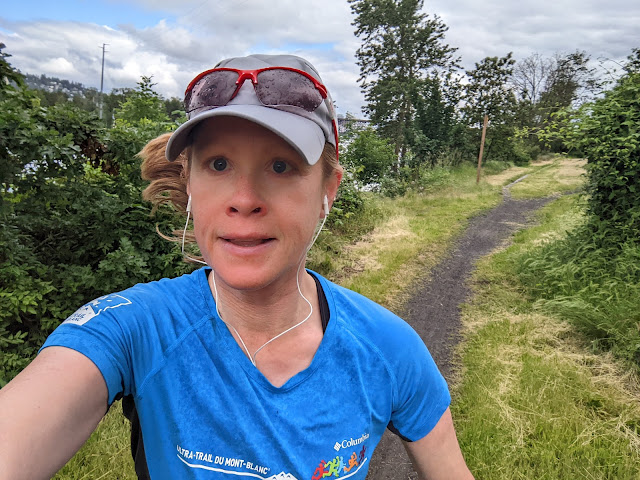 |
| Running along the Willamette River |
It's strange, the way grief comes in waves. Sometimes the turbulence is so strong that I can't even breathe, and sometimes it's a gentle tide that lulls me to sleep. But what I've learned in the past year is that it doesn't go away, that it won't ever go away, and the best I can do is work to keep my head above the water. That episode in Spanish Fork Canyon reminded me that this week was going to be hard. I managed to pull myself together and drive the remaining hour to Salt Lake, where Mom and I promptly started preparations for the continued push West.
Salt Lake to Portland is 12 hours of nonstop driving, and Mom pushed a relentless pace. I don't think she intended to; it's just what she's used to. You go into the rest stop, you use the toilet, and you're back at the car in three minutes or less. We managed one serendipitous 20-minute stop at a Panera in Boise. But the sit-down break had been so comparatively luxurious and thus wasteful that in my fluster to leave Boise, I forgot to stop for gas, which generated a not-small amount of stress in Eastern Oregon. Mom and I filled the drive with engaging discussions and emotional honesty, everything I intended to achieve from this trip, but 12 hours of nonstop conversation is also difficult for me. By the time we reached Portland, I was a shell. I've been less tired after ultramarathons.
Due to my work schedule, we had an extra day and a half in Portland before my sisters arrived. I filled the hours with work and running. With each mile, I slowly unraveled the knot in my back and brought my brain back to the present. Portland is such a beautiful city. I remember why I wanted to move here when I was young.
Lisa and Sara arrived by early Wednesday afternoon. Lisa's flight was delayed by several hours because flying is a nightmare right now (both of their return flights were canceled and they had to reschedule at the last minute.) With gas closing in on $6 a gallon and crowds bursting at the seams of every remote destination, there is a small part of me that yearns for a return to stay-at-home quarantine times ... but I digress. We were together in Oregon and we were happy. We headed toward the coast without much of a plan. We drove right by the Tillamook cheese factory so I suggested stopping there, instantly regretted this suggestion when I saw the Disneyland-like crowds, but ended up becoming enthralled with all the delicious dairy. We spent two hours at the cheese factory. Over ice cream I searched nearby destinations on my phone and proposed a diversion to Cape Meares — my sisters and I collectively remembered that "Mom loves lighthouses" and she confirmed that she does indeed love lighthouses.
We had a lovely evening in Seaside. But the following morning, I couldn't muster the energy for a run. I encouraged a visit to "Big Tree" with lunch at the local bakery. I quietly hoped we'd spend the rest of the day in Rockaway, but restlessness prevailed and by afternoon we were on the road south. We stopped at one of Mom's favorite spots, Cape Lookout, but again the trail became too mucky to hike. Mom was enthusiastic about continuing once we hit the mud, but I tried to quietly discourage this — a number of emergency vehicles were parked at the trailhead, and rescue crews passed as we hiked, indicating that someone had a serious injury, which becomes likely on trails like this. After about a mile we gave in, but at least we had a few nice views (the trail was buffed out and dry for the first half-mile, as shown here, which is why we had generated a modicum of optimism.)
While at Cape Mearas, the sisters and I embarked on a short but steep hike to the coast. The trail was an utter mess — the Pacific Northwest has received record rains this spring, so every inch was either a morass of mud, a tangle of deadfall, a puddle, or a fern jungle. The sisters were good sports.
We ended up in a narrow cove surrounded by cliffs, a secret beach where we could sit on driftwood and watch the waves. All of us had a good cry here. It's a cliche but true — the ocean is a place for healing. It's so vast that we can disappear into it for a moment, let it absorb all of the pain and grief, and simply be. The mountains are good for me as long as I can keep moving, but if and when I reach a point in my life where I require a long pause, I hope I can be by the ocean.
 |
| So I guess this is the "trail." |
Thursday, June 16. Mom had a busy itinerary in mind ... I think she just needed some distraction, to feel as though life could still be as it was when she and my Dad flitted all over the place to squeeze a full two weeks of vacation into one week. The only thing I required on this day was a least a little solo time to breathe and reflect, so I set an early alarm. We were staying at a condo in Rockaway Beach, a delightful out-of-the-way beach town with little to offer beyond a whistle-stop for a steam engine train and "the largest cedar tree in Oregon." My room had its own secret sliding door to the street, so I slipped outside at 6:30 a.m. to misty rain and temperatures in the 50s. Sublime. Thanks to the rain, grass pollen was tamped down and all of this sea-level oxygen made me feel as though I could fly. Sometimes I let myself believe I'm a complex creature who needs an entire ocean to absorb my grief, but then I get a hit of easy oxygen and realize my whole mindset can shift simply by giving my body food, water, or air.
Rockaway doesn't have much in the way of trails, so I mapped out a route on logging roads through the coastal headlands. It was a lovely run along a ridge with views of the verdant hills and big blue sea, with decimated patches of clear-cut forest to keep things real. As I descended toward town, the road I was following became fainter and more overgrown until it dead-ended altogether. I was at that point less than a half-mile from the beach. It was more than five miles back up and around, and I had a tight schedule to keep. I decided to brave bushwhacking, which proved a poor choice in this land of blackberry brambles and other types of bitey vegetation. My legs were shredded by the time I emerged from the forest. I looked like I had lost a fight with an angry street cat. But I was happy. It was a wonderful run. I was in love with Rockaway Beach.
Rain continued to pour down as we drove north to Cannon Beach, but luckily petered out in time to do all of the things. Cannon Beach is iconic and gorgeous, and also windy and cold. Cold weather is always a treat for me, but Sara, who lives in Orange County, California, was less impressed with this aspect of the "beach."
We headed over to Ecola State Park, which generated much in the way of fun sister jokes because I kept calling it "Ebola," Sara thought it was "E. coli," and we were all singing a parody yodel from the cough drop commercial, "Eeee-co-laaaa." It too was a messy place of endless peanut butter mud and badly eroded trail. I had hoped to squeeze in more hiking with my sisters, but even I was ready to admit that these tiresome conditions were too much for me.
It was lovely, though, to trek through this enchanted forest somewhere deep in Middle Earth.
I think we had all managed to distract ourselves from the difficult anniversary we came here to observe. But truthfully, I wanted to observe it. I had my opportunity here, at Indian Beach. As we sat down on driftwood, I again completely lost myself in the sound of the waves. It was so peaceful, so encompassing. I felt strongly that I just wanted to sit there for the rest of the afternoon, watch the sun set, and let the last light of June 16 disappear into the ocean. Mom seemed to be pushing for our next destination, which was Seaside. I can't blame her, as she'd already been waiting for two hours while we slipped and slid through Ecola. Still, I'll admit to feeling sadness as we drove away. I felt as though we were pushing too hard to speed through this experience, and that we'd miss it altogether.
It was Lisa who suggested Cape Kiwanda, another 20 minutes down the road and unknown to all of us. "Sand dunes," she announced as she scrolled through her AllTrails app. I had low expectations, and it was late in the day, but we were already here so why not check it out? We had another humorous family moment after we arrived in an obvious tourist town to discover the only public parking cost $10. Channeling the spirit of our father, Lisa drove through streets lined with "no parking" signs to search for a free space as Sara rolled her eyes.
"It's ten dollars," she said with an exasperated tone and then offered to just pay the fee herself. We promised we pay back our $2.50 share and everyone had a good laugh. Family jokes, you know.
Cape Kiwanda was beautiful — honestly my favorite stop of the trip. We trudged along the dunes, stopped to look at sea caves, and spend long minutes marveling at the hydraulics churning below the cliffs.
Our loop brought us to the edge of a steep dune descending back toward the beach. It reminded me of winter hiking with my dad, when we'd hit a steep snowfield and he'd suddenly leap forward, snowshoes whipping and powder flying in a barely controlled sprint down the slope. Lisa and Sara started to pick their way down the sand when I announced, "I'm going to go for it. I'm going to run." And with that, I launched forward, legs kicking and arms flailing in an exhilerating descent. My sisters quickly followed, laughing and whooping as we crushed 200 feet of vertical drop in seconds.
Still surging with adrenaline, shoes filled with sand, we ran to find our mom.
"That was just like one of Dad's favorite things in the world," I told my sisters. "Running down the snow slope."
We had one more morning in Rockaway before my sisters needed to be back in Portland to catch their rescheduled flights home, and then Mom and I would drive another 6.5 hours to Boise to visit her brother. A whirlwind trip, and I was admittedly dreading this day, as my energy levels and back pain had not yet recovered from the drive out. To help prepare my back for another day of painful compression, I mustered motivation for one last early-morning run. This time, I planned my logging road route a bit better and managed to avoid the blackberry brambles. I even squeezed in a mile along the beach.
This run was lovely, with morning fog giving way to a sunny day. It was also deeply cathartic, as rich oxygen coursed through my blood and I experienced a rare sensation that was both peaceful and powerful. I imagined a future where the ocean would always be there to swallow my sadness, but also I could still live in the mountains and a place with real winters. Of course, there's no perfect place, no permanent peace, no true stops in the journey of life — at least until the final stop. I will never stop feeling my grief, never fill this hole where I keep my love for my father. But he's been gone a year now, all of the seasons, and I believe I've reached a measure of peace with this truth. His memory lives on in the people I love, and also in the places he loved, and there is still beauty in this expansive world that nothing can take away.








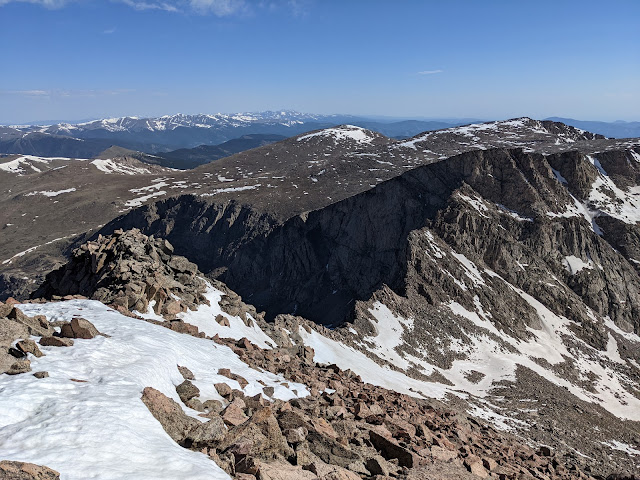
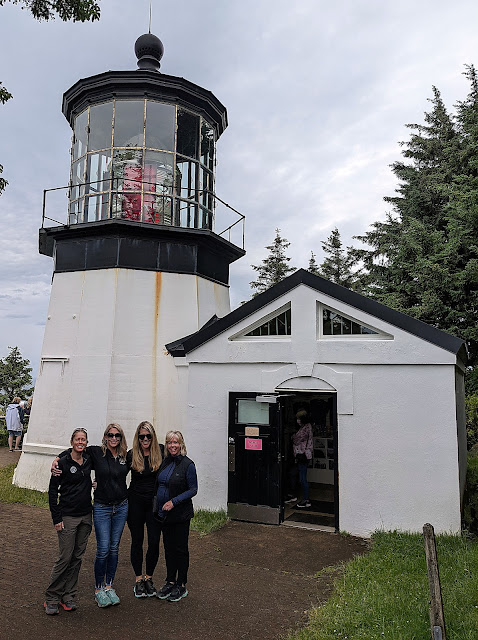
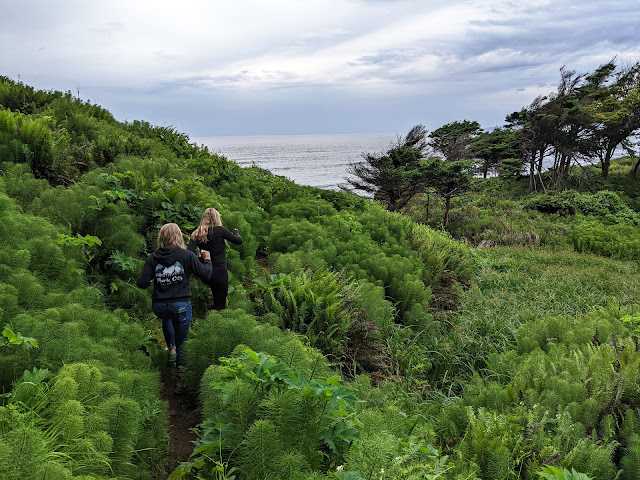









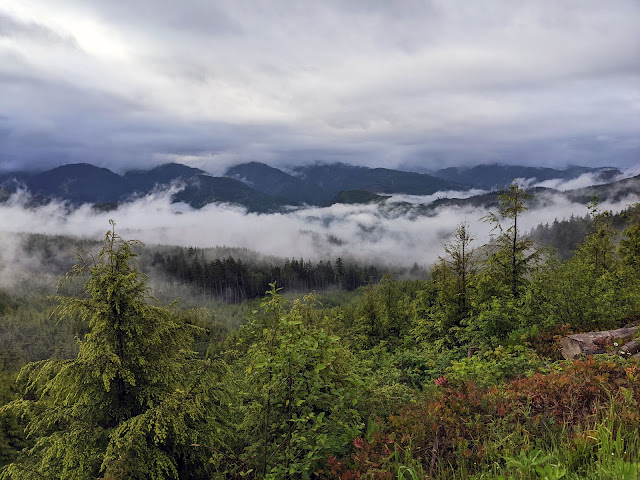
A lovely Road Trip...difficult, but needed.
ReplyDeleteBeautiful photos and post. Thank you.
ReplyDeleteI'm a year behind you and have to admit i feel overwhelmed when I see how much grief I have yet to experience. Also, you drove near me! And also, I've been thinking about Substack but that overwhelms me too. I love the coast so much.
ReplyDeleteSo beautifully written, Jill. I’m so glad you had this time together with your family in memory and honor of your dad.
ReplyDeleteBeautiful Jill. Thanks for sharing with us.
ReplyDeleteWishing you all the best in the future, sounds like a trip that was truely worthy of your memories! :)
ReplyDeleteEnjoy your adventures; moving forward heals the heart. Lovely story ♥️
ReplyDeleteI just signed up for your sub stack! I’m just a fan of all your words, so bring it on! I’m sad blogging goes to the wayside …
ReplyDeleteAlso, lovely Oregon family bonding trip!
So beautiful, what you wrote at the end.
ReplyDelete